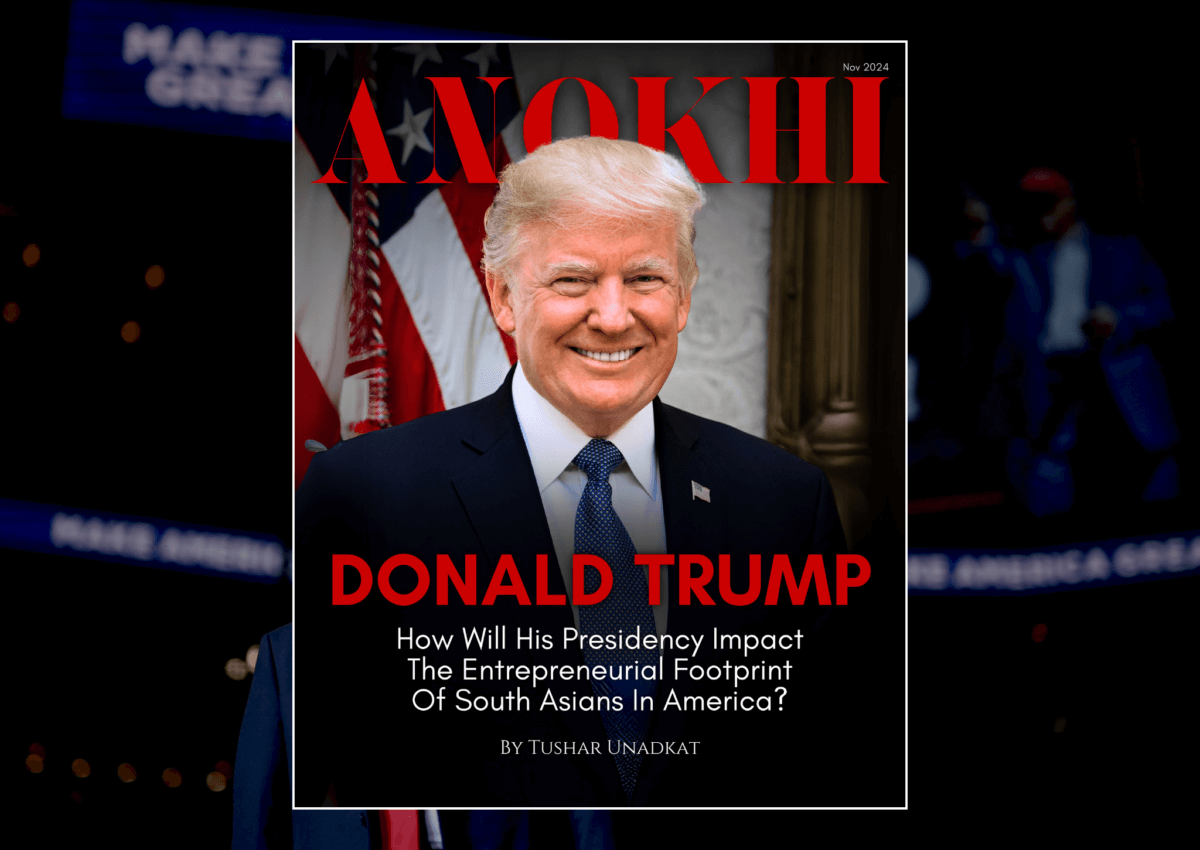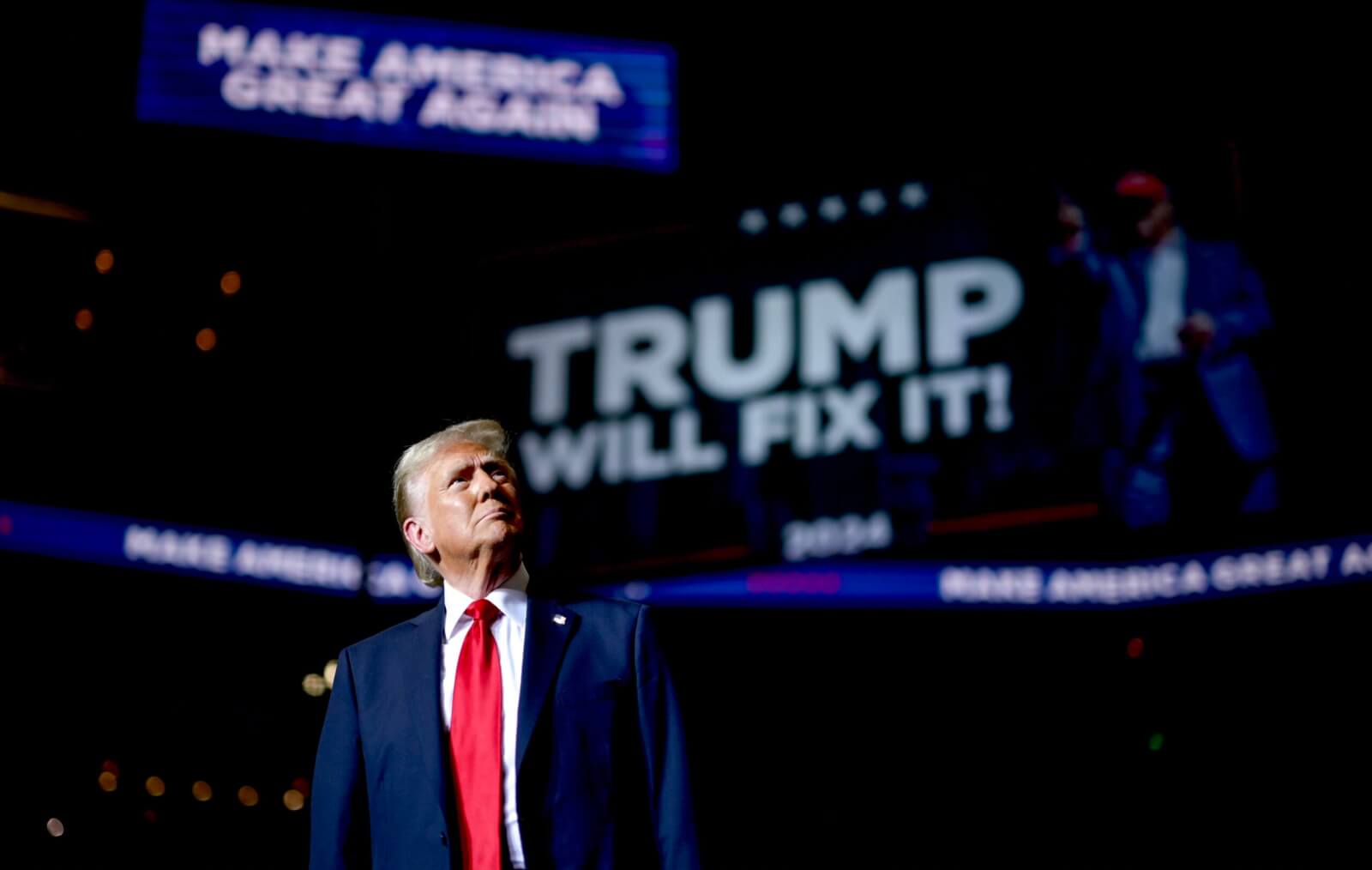
Donald Trump: How Will His Presidency Impact The Entrepreneurial Footprint Of South Asians In America?
Cover Stories Nov 06, 2024
In a stunning victory against Kamala Harris during the 2024 presidential elections, Donald John Trump is set to become the 47th President of The United States of America. He, alongside his Vice President JD Vance, will be inaugurated into the oval office on January 20th, 2025.
Donald Trump’s 2024 election win is set to have substantial global and economic consequences, impacting markets worldwide as U.S. policies shape the course of international trade, finance, and technology sectors. Given America’s role as the world’s largest economy, the influence of its economic and foreign policy shifts ripples across global financial markets, affecting everything from currency exchange rates to trade regulations. President Trump‘s approach to foreign policy, trade tariffs, and climate initiatives will be closely watched, especially by developed nations and emerging markets.

Critical Global Economic Implications of Trump’s Policies
Under Trump’s renewed administration, global markets will likely see shifts in trade agreements and an emphasis on protecting American interests, leading to further tariff negotiations or trade restrictions with major trading partners. His administration may focus on reducing trade deficits with key allies and competitors, potentially leading to higher tariffs on imports, including those from Asia and the European Union. Such moves could create friction in international trade and prompt reciprocal tariffs, impacting industries such as technology, manufacturing, and consumer goods.
Additionally, Trump’s policies may influence global currency valuation and interest rates. If the U.S. Federal Reserve aligns with Trump’s pro-growth agenda, it could implement policies to bolster domestic investments, raising interest rates to control inflation. Higher interest rates in the U.S. could strengthen the dollar, making American goods more expensive abroad and potentially impacting trade balances.
Impact on Indian and South Asian Entrepreneurs in the U.S.
As one of the fastest-growing economies and a close U.S. ally, India faces potential shifts in its economic and business partnerships with the U.S. under Trump’s leadership. The South Asian entrepreneurial community in the U.S. could feel both the advantages and challenges of Trump’s policies, particularly in areas such as taxation, deregulation, and immigration. Indian entrepreneurs have historically played a vital role in the U.S. tech, finance, and service industries, often relying on policy support for skilled labor and investment opportunities.
1. Tax Reduction and Deregulation
Trump’s administration will likely further its tax reduction and deregulation initiatives, which could benefit businesses across the board, including South Asian-owned enterprises. Reduced corporate tax rates and eased regulatory standards can lower operational costs, increasing the capital available for reinvestment. South Asian entrepreneurs, especially those running small to medium enterprises, might find it easier to scale their businesses or enter new markets under a less restrictive regulatory framework. This environment could foster innovation and encourage startups, as lower taxes and fewer regulatory requirements reduce barriers to entry.
The low tax and pro-business environment also appeal to investors, potentially leading to increased funding for minority-owned businesses. However, specific sectors, such as those related to green technology or renewable energy, might decrease funding if Trump’s policies emphasize traditional energy sources and deprioritize climate action. (Source: The White House).

2. Immigration Policy and Labor Market Impact
Trump’s stance on immigration has historically favored limiting specific immigration pathways, particularly those that do not directly serve American labor interests. This could impact South Asian entrepreneurs who depend on skilled immigrant workers, especially in tech-heavy industries where highly specialized skills are essential. A more restrictive immigration policy could reduce the available talent pool, posing challenges for businesses that rely on expertise from abroad.
However, Trump’s policies may still support high-skilled immigration routes, particularly if they align with strategic sectors like technology and manufacturing. For South Asian entrepreneurs, this means potential opportunities in these industries, though the availability of skilled labor could fluctuate depending on policy shifts. Additionally, streamlined trade policies create opportunities for export-oriented businesses, benefiting sectors focusing on manufacturing, software, and other high-demand areas. (Source: The White House).
Hypothetical Impacts if Kamala Harris Had Won
If Kamala Harris had emerged as the victor, her policies would likely have extended “Bidenomics” to support minority-owned businesses and foster economic equity. Harris’s approach would have aimed to increase access to capital, grants, and federal contracts for companies owned by Asian Americans, Pacific Islanders, and other underrepresented groups, helping close capital access and support gaps.

Harris’s administration likely would have emphasized investments in digital infrastructure and renewable energy, significantly benefiting tech-savvy entrepreneurs, including those within the South Asian community. By prioritizing digital expansion, Harris’s policies could have opened new markets for South Asian-owned companies, supporting initiatives that strengthen broadband access and modernize infrastructure, particularly in underserved areas. This focus would have directly supported industries like e-commerce, telemedicine, and remote work services, creating fertile ground for innovation among tech entrepreneurs.
Harris’s commitment to inclusivity might have led to increased funding and resources for minority entrepreneurs, making it easier for South Asian business owners to scale operations or access federal contracts. Programs that enhanced accessibility to small business loans, digital tools, and affordable healthcare options could have also provided broader support for startups and SMEs.
What Should Be The Game Plan For South Asian Entrepreneurs?
My recommendation is that South Asian entrepreneurs in the U.S. should prepare for shifting immigration policies and potential visa restrictions, especially on H-1B visas commonly used by skilled professionals.
Entrepreneurs are advised to closely monitor regulatory changes, proactively build a diverse workforce to reduce dependence on foreign talent, and explore alternative visas if needed. Additionally, focusing on compliance with new tax and trade regulations becomes essential to avoid unexpected penalties.
Furthermore, strengthening relationships with U.S.-based customers and partners to demonstrate commitment to the U.S. market would be helpful to mitigate challenges tied to policy uncertainties.
Summary
In summary, Donald Trump’s win and anticipated focus on tax reduction and deregulation will shape a business landscape that favors lower costs and reduced bureaucratic hurdles. However, these policies may present specific challenges, particularly around immigration and talent acquisition, which are crucial for South Asian (U.S-based) and Indian (India-based) entrepreneurs reliant on skilled labor. In contrast, a Harris administration might have strengthened inclusivity and broadened financial support, especially for minority-owned businesses, providing them with a more resilient foundation for growth.
Ultimately, the 2024 election results have set the U.S. economy on a path with unique implications for international markets, foreign relations, and minority business growth, leaving South Asian entrepreneurs in America to adapt to the opportunities and challenges of the Trump administration.
We would love to hear your thoughts in the comments on social @anokhilifestyle.
Cover Image: Official portrait of President Donald J. Trump by Shealah Craighead
Donald Trump Wins U.S. Donald Trump Wins U.S. Donald Trump Wins U.S.
Author
Internationally celebrated, award-winning media personality and author of several business and lifestyle articles, Tushar Unadkat, is the CEO, Creative Director of MUKTA Advertising, Founder, and Executive Director of Nouveau iDEA, Canada. He holds a Master of Design from the University of Dundee, S...













































































